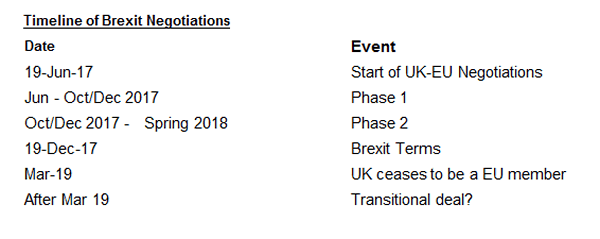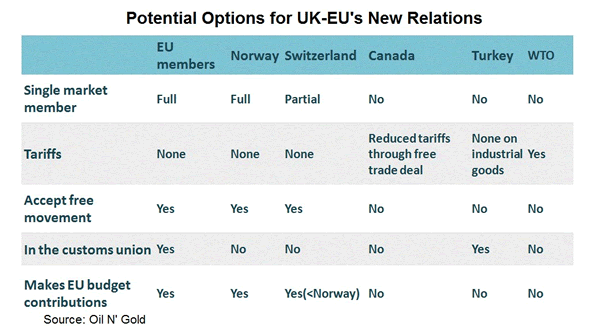Brexit negotiations return to the driver’s seat as the third round of talks in phase one (withdrawal terms) is set to begin int he week of August 28. Last week, the government, facing criticisms of its lacking preparation, released the policy papers on future customs arrangements, and Northern Ireland and the border with Ireland. The UK’s positions, in particular the customs arrangements, triggered criticisms and are expected to delay the completion of the first phase negotiation, limiting the time for the second phase (trade issues). British pound has remained under pressure recently, with GBPUSD hovering around a one-month low and EURGBP firming around the highest levels in 10 months.
Customs Union
At a ‘future partnership paper titled Future Customs Arrangements, the UK signaled it intends to remain part of the EU’s customs union during the transition period after March 2019. It also proposed two options for future relations with the single market. Generally speaking, customs union is a form of economic integration between two or more countries, in which member-states trade with no barriers, but they adopt a common set of trade restrictions with non-members. The degree of integration under customs union is merely higher than free trade agreements, way less than economic union, e.g. EU.
Two Options for Future UK-EU Customs Relations
The UK outlined two options for future trade relations with the EU, basing on the aims of seeking ‘the freest and most frictionless trade possible in goods between the UK and the EU’ and, at the same time, forging ‘new trade relationships with our partners in Europe and around the world’. The first is a highly streamlined customs arrangement, under which the UK would manage a new border with ‘as few additional requirements on EU trade as possible’. Under the arrangement, the UK would "simplify’ processes, there will ‘remain an increase in administration compared with being inside the customs union’. The second option is a new customs partnership, under which the UK aligns its approach to the customs border to an extent that there is no need for a UK-EU customs border. This arrangement requires a ‘robust enforcement mechanism that ensures goods which had not complied with EU trade policy stayed in the UK’. Indeed, UK’s Brexit Secretary David Davis indicated last week proposed for a ‘shortish’ transition period for a deal allowing the transit of goods across borders to continue under a temporary customs union.
In our opinion, the ultimate goal of the proposals is for the UK benefit from trading with the single market barrier-free, while minimizing its responsibilities. For instance, all member-states of a customs union have to adopt the same barriers to countries outside the union. However, in the new customs partnership option, the UK seeks to impose no customs border between the UK and EU single market, while at the same time allows the UK to engage in trade deals with other countries. There is not precedence of arrangement like this as the EU has never shared a frictionless customs border with any other country outside the European Union and customs union. For instance, under the Turkey-EU customs union, customs declarations and border checks are required to comply with rules of origin. Meanwhile, the UK’s proposal is contradictory to the principals of the EU single market, which believes certain rules such as acceptance of EU law are facilitators of ‘frictionless trade’. The highly streamlined customs arrangement appears more practical but also more expensive in terms of implementation as a new border would be set.
Undoubtedly, the EU has poured cold water on the proposals, noting that it would only address UK’s preference on future relations ‘once we have made sufficient progress on the terms of the orderly withdrawal. An agreement on a future relationship between the EU and the U.K. can only be finalized once the UK has become a third country’. Indeed, the EU has previously criticized the UK of ‘cherry-picking’ and affirmed that ‘frictionless trade’ is not possible outside the Single Market and Customs Union’.
We are concerned that UK’s insistence of a hard but smooth Brexit would hardly be achievable and is prone to delaying the first phase negotiation. So far, both parties have not agreed on the ‘divorce bill’ – a critical topic in phase one negotiations, making it difficult to move on to the next phase (trade, transitional arrangement). Given the hardened stance in the EU, UK’s proposals on trade and future customs relations (these topics are supposed to be discussed on phase two) on this stage are not helping break the current negotiation deadlock.


